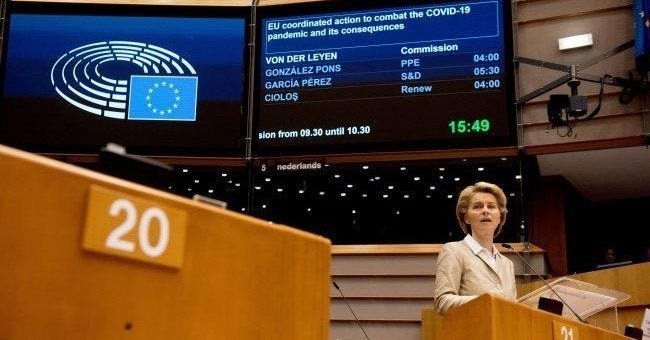The European Parliament held its second plenary session on the coronavirus pandemic on 16th April in Brussels. Parliamentary work does not seem to be completely suspended by the lockdown measures and MEPs were expected to focus, in particular, on the emergency funds sent by the Commission to rescue the European economy.
In her trilingual speech, President Ursula von der Leyen said she was particularly proud of the European response to the pandemic, while acknowledging certain mistakes and calling for more to be done to enable the EU to adapt in a rapidly changing world.
“The beating heart of solidarity”
After an introduction in which she paid tribute to all the bereaved families, as well as to those who perished while helping the emergency services, President von der Leyen quickly acknowledged mistakes that the EU had made when Italy found itself overwhelmed by the virus: “Yes, it is true that no one was really ready for this [pandemic]. It is also true that too many were not there on time when Italy needed a helping hand [...]. Europe as a whole offers a heartfelt apology.”
This acknowledgement was also used to highlight all the solidarity towards the people which were affected the most. “In fact, we have seen every type of equipment go in every direction across Europe, from whoever can spare it to whoever needs it. This makes me proud to be European” declared the President of the Commission, while emphasising that the EU was now the “beating heart of solidarity” thanks to the various rescue plans offered by the Commission, the European Council and the Eurogroup. “We will use every available euro we have - in every way we can - to save lives and protect livelihoods of Europeans [...]. As a result of all of this action, Europe’s collective response is well above €3 trillion.”
According to von der Leyen, the EU has learned lessons from previous crises. She claimed that: “Europe has done more in the last four weeks than it did in the first four years of the last (Eurozone) crisis” whilst at the same time facing “economic collapse” unparalleled with the crises of the previous decade, for which “no one is to blame, but which affects everyone”. An implicit reference to the words of the Dutch Finance Minister, who wanted to open an inquiry on why Mediterranean countries didn’t feel financially capable of coping with the economic crisis, perhaps?
“Independence” and “cohesion”
However, the debate has long since shifted to the long-term European response. While the immediate response appears to be well-documented, many questions concerning the European economic recovery plan remain unanswered for the time being. Opposition between European partners is likely to be exacerbated during discussions which will, undoubtedly, largely determine the future of the EU.
For President von der Leyen, the EU must show its “independence” and “cohesion”. This crisis will, by force of circumstance, reduce Europe’s dependence, particularly in the medical field, where many investments in vaccine research as well as the pooling of European medical resources, are essential. Similarly, for cohesion purposes, financial investments are needed in order to alleviate the effects of the crisis where they are particularly acute, supplied particularly by “the cohesion fund which will be used without any conditions".
A “pioneering” Europe in a radically different world
Looking even further ahead, the EU’s place in the “world of tomorrow [which] will look very different from that of yesterday” must be secured and Ursula von der Leyen paid particular attention to this point. She emphasised that ”Europe can shape this new world“, calling for a ”pioneering spirit".
For once, figures of European federalism were mentioned, to show that the EU was in a crucial position for its future: “and for this, I want to cite a sentence from the Ventotene Manifesto – written by two of Italy and Europe’s greatest visionaries: Ernesto Rossi and Altiero Spinelli, two of our founding fathers. Writing from their prison on a remote island, at the height of the war, when all hope of a united Europe seemed lost, they gave us these words of confidence: ‘The moment has arrived in which we must know how to discard old burdens, how to be ready for the new world that is coming, that will be so different from what we have imagined.’ ”
“This moment when we need to put behind us the old divisions”, said von der Leyen, “has arrived once again”. It must enable Europe to transform itself profoundly, so that it becomes more durable and resilient and so that it can rely on the European budget, which has become a real “Marshall Plan for European recovery”. Nevertheless, this reference to Spinelli in particular, who dedicated his political life to the construction of a federal Europe, contrasts with the character of the European response, which is still too intergovernmental during this typically transnational crisis.
Italy demands more solidarity
Will this speech full of emphasis be the start of a new era for the EU, in which solidarity will take precedence over national selfishness, as the Ventotene Manifesto expresses? The very definition of “European solidarity” still needs to be agreed upon.
Apparently unmoved by the historical reference used by Ursula von der Leyen, Italy has refused the aid offered by the European Stability Mechanism (ESM), which allocates credit that isn’t subject to the usual conditions— only up to 2% of the beneficiary state’s GDP. In the case of Italy, this aid would amount to 35 billion euros - a considerable sum, but insufficient, especially without any other risk pooling mechanism at European level.
This is what the German newspaper Tagesspiegel is given to understand about the transalpine decision: “Italy and other nations such as France and Spain expect not just what they consider ESM alms, but real solidarity from the EU in the form of repayable, special-purpose ’coronabonds’ for which the member states are jointly liable. ... The refusal of Germany, the Netherlands and Austria to go along with this form of European solidarity despite an unprecedented emergency disappoints even die-hard pro-Europeans in Italy. Above all, however, it’s grist to the mill of right-wing populists and anti-Europeans such as Matteo Salvini. ... Since the dispute over the ’coronabonds’ he’s come back with a vengeance. ... ’Coronabonds’ would also be ’anti-Salvini bonds’.”
In short, the rebuilding of the EU is only possible through reinforced solidarity within the Eurozone and the EU as a whole. It remains to be seen whether the quote from Spinelli and Rossi used by President von der Leyen will be prophetic and actually lead to overcoming our own divisions.


Follow the comments: |
|
